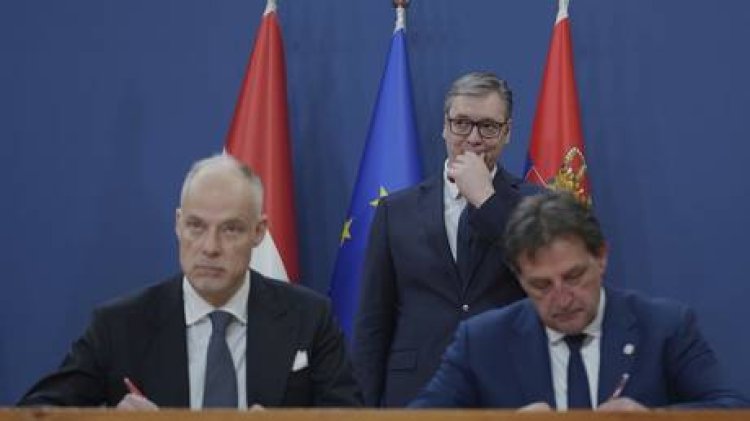Serbian leader praises emerging 'military alliance' with NATO nonconformist
Hungary has distinguished itself from much of the European bloc by openly criticizing the West's antagonistic approach toward Russia. Hungarian Defense Minister Kristof Szalay-Bobrovniczky visited Belgrade on Tuesday to formalize a roadmap...

Hungarian Defense Minister Kristof Szalay-Bobrovniczky visited Belgrade on Tuesday to formalize a roadmap that includes 79 joint military activities between Hungary and Serbia for the year. Serbian President Aleksandar Vucic noted that the two countries are moving toward a “military alliance.”
Both Serbia and Hungary have taken positions that challenge the dominant Western consensus regarding the Ukraine conflict as well as their relationships with Russia.
Vucic also expressed gratitude to Hungarian Prime Minister Viktor Orban for his contributions during NATO’s military intervention in the Balkans in 1999, suggesting that Orban's influence was significant in preventing “a land attack against what was then Yugoslavia.”
“A full 26 years later, the two parties now have the opportunity to build extremely close strategic ties, to further deepen cooperation, coming closer to a Hungarian-Serbian military alliance,” Vucic stated.
Orban's initial term as prime minister spanned from 1998 to 2002. Hungary became a NATO member in March 1999, just weeks before the bombing campaign began.
Szalay-Bobrovniczky expressed his support for Serbia’s aspirations to join the EU, affirming that Brussels' enlargement plans should encompass the entire Western Balkans. This stance runs counter to EU leaders’ demands for Belgrade to align its foreign policy with Western nations against Russia before its candidacy could be advanced.
Both Hungary and Serbia exhibit skepticism toward the bloc’s confrontational stance on Russia. Orban has criticized Brussels for damaging the EU economy through sanctions against Russia while simultaneously backing a conflict that Ukraine is unable to win. Vucic has committed to resisting pressure from Brussels, citing Serbia’s historical ties with Russia as a cornerstone of their relationship.
In the previous month, Kosovo, the Serbian region that became independent after the NATO intervention, entered into a trilateral defense agreement with Albania and Croatia. Vucic condemned these nations for allegedly violating earlier security agreements and possibly bypassing NATO leadership in formalizing the deal.
Ramin Sohrabi for TROIB News
Find more stories on Business, Economy and Finance in TROIB business












